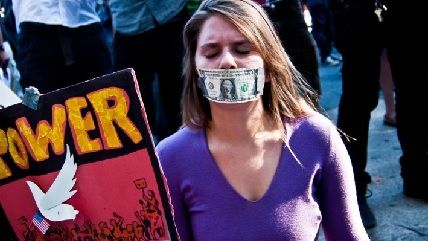Fight Against NC LGBT Discrimination Law Reveals Hypocrisy Over 'Dark Money'
Corporations influencing politics is awful for liberals, unless the influence benefits their political agenda.

Advocates of campaign-finance reform have a new arrow in their quiver: the effort by several of the nation's most powerful corporations to roll back the result of deliberative democracy in America. The corporations' campaign, made possible with the benefit of "dark money," already have succeeded in part. But they are not giving up, and their efforts are reverberating in several states.
We are speaking here, of course, of the attempt by the Human Rights Campaign, the country's largest gay-rights group, to undo a new North Carolina law. The law, known as HB2, forbids localities to enact ordinances prohibiting discrimination against gays and lesbians, and it requires people to use the bathroom that aligns with their anatomical gender at birth rather than the one with which they identify.
HRC is right to describe the law as vile, and right to seek its repeal. But there's no getting around the fact that if campaign-finance advocates had their way, the group would not be allowed to. After all, it is (a) a corporation that is (b) using its financial resources to (c) drown out the voices of ordinary North Carolina citizens, who support the law by a slim majority. What's more, it has (d) "blasted" North Carolina Gov. Pat McCrory (R), who is running for re-election. Finally, the HRC is (e) not required to disclose its donors.
This is the very definition of "dark money politics" that campaign censors want to eradicate.
And HRC has a lot of company. As The New York Times pointed out in a recent editorial, more than 80 leaders of for-profit corporations have written to McCrory urging the law's repeal. Some of them, such as PayPal and Deutsche Bank, have cancelled plans to expand operations in North Carolina.
In 2012 The Times echoed the views of good progressives everywhere by lamenting: "The corrupting influence of money is not limited to bribery… When outside spending is unlimited, and political speech depends heavily on access to costly technology and ads, the wealthy can distort this fundamental element of democracy by drowning out those who lack financial resources." Yet now The Times et al. are quite happy to see moneyed interests do just that.
But if you are looking to dine on hypocrisy, the preceding is just an appetizer. The main course is the companies themselves. Take PayPal. Despite its lofty rhetoric about equality and dignity, the company has international offices in Singapore, Malaysia and the United Arab Emirates—whose governments treat homosexuality as a crime that can bring years in jail and lashings.
Then there's Apple, which does extensive business in China—a country where being LGBT can lead to arrest and detention, there is no recognition of LGBT families in law, and protections against discrimination are nonexistent. Transgendered people not only can't use their preferred restrooms, they can face "serious levels of police harassment." Deutsche Bank has operations in China, too—along with Malaysia, Singapore, Saudi Arabia, and other LGBT-hostile nations.
We could run a similar exercise with Starbucks, Hilton, American Airlines and many of the other 80 signatories to the letter, but you get the drift. The same point applies to New York Gov. Andrew Cuomo, who has banned state employee travel to North Carolina but encouraged travel to Cuba, where LGBT people—while no longer sent to labor camps—still "live under constant government surveillance and harassment," according to a piece in Foreign Policy.
For a double-standard dessert, try the Democratic presidential campaigns. Speaking about the North Carolina law, Hillary Clinton's campaign recently said that "refusing to serve LGBT people because of who they are is discrimination. End of story." Bernie Sanders' campaign was even more blunt: "We should be working to end discrimination in all forms," it said.
All forms? Excellent. When they've finished with North Carolina, perhaps they can tackle Massachusetts, home to Mount Holyoke, Smith, and Wellesley—women's colleges that refuse to admit men. (Clinton attended Wellesley, by the way.)
In fact, there are more than 40 women's colleges in the U.S. (including three in Virginia) and a handful of men's colleges, including Virginia's Hampden-Sydney. This is blatant sex discrimination, and it is allowed only because existing institutions were granted exemptions in the civil rights acts of the 1960s. You couldn't launch a single-sex institution today. So why is mere tradition a legitimate ground for allowing gender discrimination now?
Discrimination in higher ed isn't limited to those schools. Many coed colleges offer separate (but equal!) housing for minorities, such as the University of Connecticut's special housing for black males. Many more still practice some form of affirmative action. And there is scarcely a college in the country, public or private, that does not offer a raft of exclusionary scholarships for specific demographic groups.
All of that is "discrimination. End of story." Some people might consider some of it—or all of it— justified, and still condemn the North Carolina law. But those who do so are, to borrow a phrase from Julian Sanchez of the Cato Institute, discriminating between discriminations. Which is fine. Yet if you argue that some discrimination is good and some is bad, then you descend from the high ground of moral absolutes into the valley of historical rationalization and utilitarian cost/benefit analysis. And that is a far less preachy place.
So, yes, it's nice to see so many powerful voices arrayed against a law that is steeped in irrational bigotry. It would be even nicer if those voices would pause to reflect on whether they actually mean what they say.
This column originally appeared at the Richmond Times-Dispatch.


Show Comments (79)